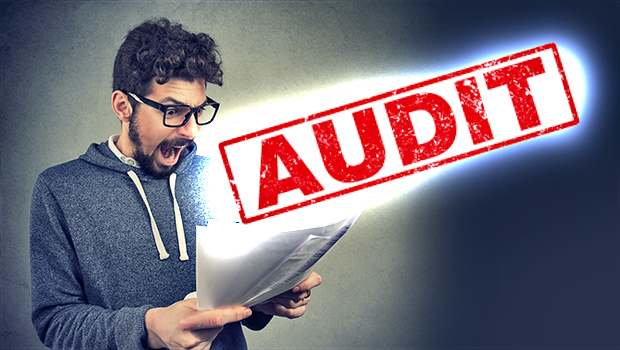The chances of getting audited by the IRS, in a pure mathematical sense, are small. So this might tempt you to try and cheat on your taxes. But these basic audit numbers are deceiving because the IRS doesn’t randomly decide who to audit.
IRS Audits: Statistics Versus Probabilities
As a general rule, the higher your adjusted gross income, the greater the chance of an IRS audit. This isn’t a perfect correlation, but it’s close. The following chart shows the audit rate in 2018 of individual tax returns based on adjusted gross income:
| Audit Rate | Adjusted Gross Income |
| 6.66% | $10,000,000+ |
| 4.21% | $5,000,000-$10,000,000 |
| 2.21% | $1,000,000-$5,000,000 |
| 1.10% | $500,000-$1,000,000 |
| 0.53% | $200,000-$500,000 |
| 0.44% | $100,000-$200,000 |
| 0.45% | $75,000-$100,000 |
| 0.54% | $50,000-$75,000 |
| 0.48% | $25,000-$50,000 |
| 0.69% | $1-$25,000 |
| 2.04% | $0 |
Source: https://www.nolo.com/legal-encyclopedia/what-are-the-odds-being-audited.html
The IRS has such low audit rates because they don’t have the resources to conduct more audits. There are also other factors that reduce the audit rate (which used to be as high as 5.6% in 1963). These include changes to federal law that make going after tax evaders more difficult and the IRS trying to have its taxpayer interactions revolve more around customer service as opposed to tax enforcement.
But the biggest reason as to why the above numbers don’t accurately reflect a taxpayer’s chances of getting audited is because the IRS has special tricks that they use for when deciding which return gets audited. So claiming certain deductions or credits, for example, will automatically increase the chances of getting audited.
IRS Trick #1: Artificial Intelligence
One of the best tools the IRS has in deciding who to audit is the Discriminant Information Function (DIF). This special computer system will examine every single tax return filed with the IRS and look for potential problems. If one is found, it will be selected for further review by a human being.
Unfortunately, we don’t know exactly how the DIF works or what exactly it looks for. And even if we did, the IRS is probably making tweaks to it every year. But for the most part, the DIF is looking for tax return anomalies. This might be a child being claimed as a dependent on two returns. Or perhaps a tax deduction of a certain size in relation to income.
IRS Trick #2: The Bank Secrecy Act
The Bank Secrecy Act is intended to fight money laundering, tax evasion or other financial crimes. This law places certain requirements on banks to maintain records of certain financial transactions, especially those involving cash in the amount of $10,000 or more. The Bank Secrecy Act also imposes a more general mandate on banks to look for and report any suspicious activity, especially anything that might be a sign of tax evasion.
IRS Trick #3: The Earned Income Tax Credit
Recall the above chart and how the chances of being audited go up as the taxpayer earns more money. But the chances of getting audited also go up the less the taxpayer makes. That’s because it’s often the very rich or those at very low-income levels that try to take the most advantage of certain tax benefits. One good example is the Earned Income Tax Credit (EITC).
The EITC is a special refundable-tax credit for low-income families. Because of how popular and beneficial this tax credit is, the IRS takes a special look at any tax return requesting the EITC.
Additionally, thanks to the Protecting Americans from Tax Hikes Act (PATH Act), the IRS cannot issue any tax refunds until the middle of February. This gives the IRS extra time to confirm the EITC is properly going to the taxpayer.

